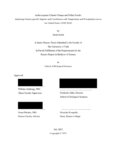TO
1 - 25 of 5
| Creator | Title | Description | Subject | Date | ||
|---|---|---|---|---|---|---|
| 1 |
 |
Kober, Derek | Anthropogenic Climate Change and Pollen Trends: Analyzing genera-specific impacts and correlations with temperature and precipitation across the United States (1990-2018) | Studies have shown that human-driven climate change is associated with both higher airborne pollen concentrations and extended allergy seasons. Research particularly indicates that the concentration of pollen is positively correlated to increasing temperatures. This study aims to analyze the pollen ... | 2023 | |
| 2 |
 |
Wiese, Claudia | DNA metabarcoding of trnL intron using the minion device to assess BEE foraging from Pollen | In recent decades many bee species, including Apis mellifera (European honeybee), have experienced worldwide population declines. In this paper we tested a novel molecular approach to evaluate foraging of A. mellifera Specifically, we sequenced trnL (UAA) intron DNA barcodes from isolated pollen fro... | 2023 | |
| 3 |
 |
Andersen, Kara | Cervical dorsal root ganglion imaging for studying neuronal nocicieptive ciruit changes in migranine models | Migraine neuroscience is a field in its infancy, with migraine being a remarkably common yet poorly understood sensory circuit disorder. It is characterized by attacks of unilateral, throbbing craniofacial pain, with sensitivity to movement, visual, auditory, and other afferent inputs. Migraines can... | 2022 | |
| 4 |
 |
Som, Sarita | Virus-like weapons used for competition in wild plant populations | Plant diseases caused by bacterial pathogens pose significant economic challenges globally, necessitating the exploration of alternative methods for controlling bacterial infections in plants. Tailocins, virus-like weapons produced by bacteria, have emerged as potent antibacterial agents and hold po... | 2023 | |
| 5 |
 |
Gormick, Alexa | Towards orthogonal transcriptional repression: high-throughput mapping of TETO2 operator variants on TETR repressor function | Recent gene therapy advancements have progressed the treatment of a spectrum of disorders and diseases caused by dysregulation of gene expression programs and their transcriptional regulators. However, existing genetic therapies largely lack tunable control of exogenous gene expression. Here, we des... | 2024 |
1 - 25 of 5
